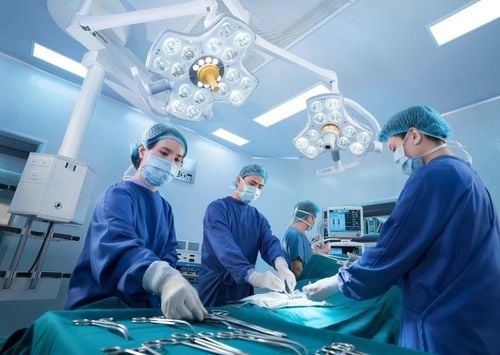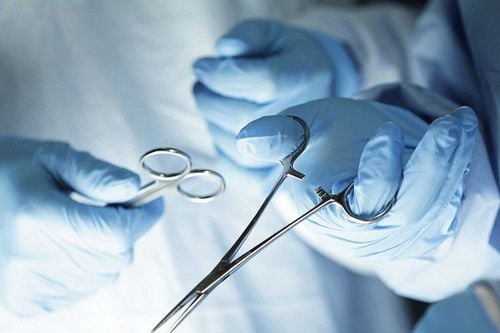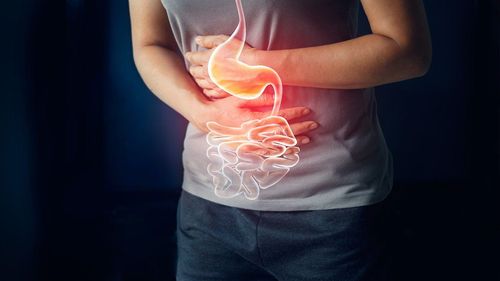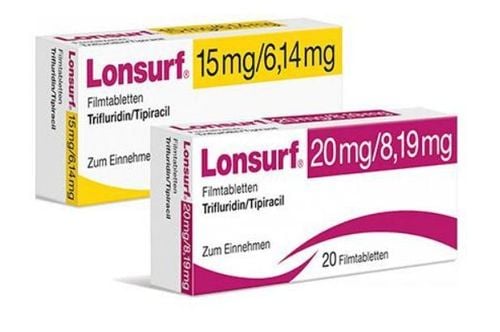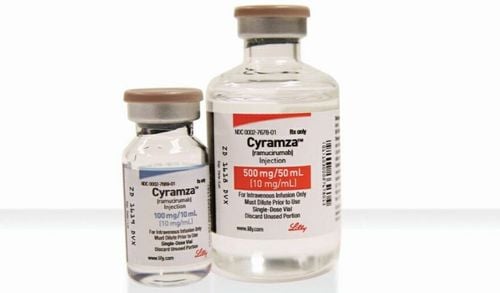This is an automatically translated article.
Stomach cancer is quite common in our country, with a high mortality rate. However, if detected early and treated promptly, the cure rate is up to 90%. Currently, there are many methods to cure stomach cancer as well as to support treatment to improve the quality of life of patients during treatment. So what are these stomach cancer treatments?
1. What is stomach cancer and what causes it?
Stomach cancer begins when cells in the lining of the stomach grow abnormally, multiply uncontrollably, invade nearby tissues, or metastasize to other distant organs in the body through the system. lymphatics, blood vessels.
Currently, the exact cause of the disease is not known, but there are several factors that can increase the risk of the disease that are often mentioned such as:
Infection with the H. pylori bacteria that causes ulcers Gastritis Pernicious anemia Stomach polyps Smoking Eating too much salty, pickled, smoked foods Regular alcohol consumption History of stomach surgery Blood type A Infection with Epstein-Barr virus Human history in the stomach cancer family Genetic factors such as familial adenomatous polyposis, hereditary nonpolyposis colon cancer (Lynch syndrome) and Peutz-Jeghers syndrome.
2. Symptoms of stomach cancer you may experience
Symptoms of stomach cancer can include:
Indigestion Feeling bloated after eating Heartburn benign diseases of the stomach. Therefore, patients often subjectively do not perform early screening and this is also one of the causes of stomach cancer that is often detected late.
More serious symptoms you may experience as the tumor grows such as:
Abdominal pain Blood in your stool Vomiting Unexplained weight loss Difficulty swallowing Stomach swelling Weakness
3. How is stomach cancer diagnosed?
In addition to examining your physical symptoms, your doctor will also ask you about your medical history to see if you have any risk factors for stomach cancer. You will then be given some tests such as:
Endoscopy : inserting a thin, flexible tube with a small camera down your throat to look at your stomach Biopsy: taking a small tissue sample from your stomach you to look at signs of cancer cells under a microscope Blood tests for signs of cancer in the body CT scans
4. What are the treatments for stomach cancer?
4.1 What are the main cures for stomach cancer? Depending on the symptoms, stage, and spread of the disease in your body, the specialist doctors will recommend the appropriate course and treatment. The main treatments for stomach cancer include:
Surgery
A method to remove the tumor from the body. You may be advised to remove all or part of the stomach where it is damaged along with the surrounding lymph nodes. Surgery can be performed laparoscopically, open surgery, or robotic surgery. In the case of a complete gastrectomy, you will be placed in the gastrointestinal tract after surgery.
Radiation therapy
Is a method of using high-energy radiation rays to directly affect cancer cells to destroy them. Radiation therapy can be performed alone or in combination with surgery for the most effective results. In many cases where the tumor is large, you may be prescribed radiation therapy to shrink the tumor before surgery. Radiation therapy can also be applied to support after surgery to reduce the possibility of local recurrence. Radiation therapy is also a treatment for metastatic stomach cancer to relieve symptoms when the tumor has spread to the bones and lymph nodes.
Chemotherapy
Is a method of using chemicals to kill cancer cells, slow down the proliferation of cells. These chemicals can be given intravenously and/or orally. Chemotherapy can be used in combination with radiation therapy, and can be used before and/or after surgery.
Targeted therapy
Also known as Targeted therapy, is a method often used to treat metastatic, recurrent or local gastric cancer when radiotherapy and surgery alone cannot completely destroy it. cancer cells. With targeted therapy, your doctor will prescribe targeted drugs (maybe combined with chemotherapy) to limit the growth and spread of melanoma.
4.2 Stomach cancer treatments that help improve quality of life Due to stomach cancer as well as the impact of main treatments, you usually need supportive treatment to reduce it. symptoms, complications, postoperative recovery to improve quality of life.
Use pain relievers: From mild levels like paracetamol to narcotic pain relievers like dolargan, morphine.
Nutrition: Ensure a nutritionally balanced meal to strengthen the body's immunity, help you recover early after surgery, as well as respond well to chemotherapy and radiation treatments,
Eat small meals Eat, varied meals: After surgery to remove part or all of the stomach, you may not receive as much food as usual, accompanied by a feeling of loss of appetite, so eat small and varied meals. Meals will help stimulate appetite and ensure you are always replenished with nutrients and energy.
Psychological care: Anxiety, pessimism, negative thoughts are common problems in most people with stomach cancer, so you will need psychological care. If you can't change your mind on your own, family members and treating doctors will help you.
Non-drug therapies like yoga, massage, meditation and hypnosis can help you live better during cancer treatment. Some relieve stress and help clear your mood, or can make the side effects caused by chemotherapy or radiation a little easier.
Acupuncture, an ancient Chinese practice that uses thin needles inserted under your skin, can relieve symptoms such as insomnia, pain, nausea, digestive disorders, and more.
Currently, acupuncture is used a lot to limit the use of pain relievers for patients and it is one of the most significant stomach cancer treatments when the disease is in the final stage, bringing good results. high treatment results. After examining and diagnosing the pathology, the qualified doctors will offer a treatment method with a suitable acupuncture point for each patient. Measures are often applied in clinical practice such as: electro-acupuncture, hydro-acupuncture, ear-acupuncture, acupuncture, etc. However, there are also some cases where this method is not recommended, such as: you are severely depleted, are suffering from serious medical emergencies or infections,...
5. How can I prevent stomach cancer?
Treatment of stomach infections: Healing of ulcers will reduce the risk of stomach cancer. If you have ulcers caused by an H. pylori infection, you may need to take some antibiotics to kill them.
Eat healthy: Eat lots of fresh vegetables and fruits to add fiber and vitamins to your body, which will help reduce your risk of stomach cancer. Limit foods that are too salty, pickled, salted or smoked
Keep a reasonable weight.
Don't smoke: Your risk of stomach cancer is doubled if you use tobacco.
Monitor NSAID or aspirin use. If you are taking daily aspirin to prevent heart problems or NSAIDs for musculoskeletal conditions, talk to your doctor about how these drugs affect your stomach.
Vinmec International General Hospital is one of the hospitals that not only ensures professional quality with a team of leading medical professionals, modern equipment and technology, but also stands out for its examination and consultation services. comprehensive and professional medical consultation and treatment; civilized, polite, safe and sterile medical examination and treatment space.
Please dial HOTLINE for more information or register for an appointment HERE. Download MyVinmec app to make appointments faster and to manage your bookings easily.





